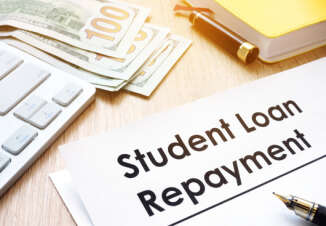The content on this page is accurate as of the posting date; however, some of the offers mentioned may have expired.

Like everything else, student loan debt is on the rise. In fact, student loan debt increased 10 percent each year from 2000- 2010. This is in part to rising tuition and living costs, and students` general lack of knowledge when it comes to finance and money matters.
Currently, our students face a sad fate. Their student loan debt is higher than the average credit card household debt. According to a study, in 2011 the average student loan debt is anticipated to be around $22,900 - this is the highest it has ever been. The study also finds that students who attended college during 2008`s recession and the years after are more likely to default on their loan and credit card accounts.
It’s all very scary. But if you proceed with caution, here are some ways that you can make it through those loan repayments.
- Know How Much You Owe.This is always the first and most important step in debt repayment. You can`t appropriately get your funds together if you don`t know what your goal is and who you will have to be paying off. Once you find out where the money is going and to whom, you can budget accordingly. While budgeting make sure to allot money for personal savings and an emergency fund.
- Pay it Off Fast. Do your best to make loan repayment a priority, especially if you have a credit card with a high interest rate. Most loans will give graduates a grace period of six months upon graduation, but I suggest you make payments throughout that grace period. Ask your lender about special repayment plans and ways to get your balance lowered. Some lenders have programs where payments are lowered if automatic bill payments are set up or if you have a record of on time payments.
- Even After Graduation, Live the Student Life. Remember searching for the spots with the cheapest pizza deals, or the best drink specials. Keep living like a student who has minimal funds, it will pay you off in the long run. In college, you`ve got to stretch every dollar, it`s a skill that all of us acquire. Put it to use until you find a good job or eliminate all of your debt.
- Don`t Get More Debt. If you`ve got thousands of dollars in loan repayments, it wouldn`t be smart to rack up more debt by going on lavish shopping sprees and vacations. Keep focused on your goal, and pay off your loans on a monthly basis. If you want to take a big vacation, pay off more than the minimum payment and soon enough you can take a rewarding trip.
- Get a Job. Your dream job may not be rolling out the welcome wagon for you, but don`t let that deter you from working. Our economy is in a scary state, so take any job that you can get that pays the bills and doesn`t challenge your moral code. Try working at a restaurant or at the library in your community, don`t be too proud. And some employers, like the government, will often help you with loan repayments if you ask.
Graduating college is a new and exciting experience. But, you must remain focused and dedicated to your managing your personal finances to not end up head over heels in debt. Loan repayments are a rite of passage for the majority of college students, if done correctly you can make it out with a healthy credit score.





